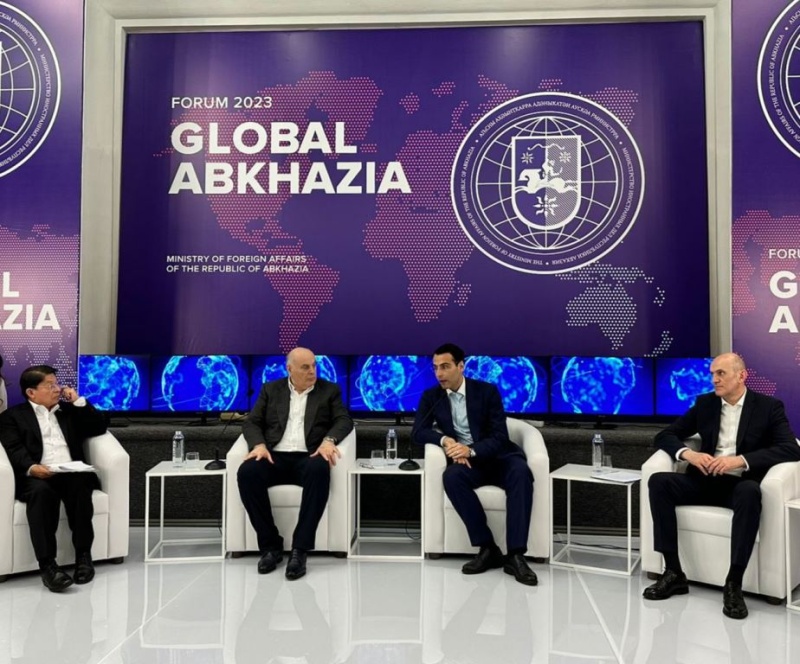Exploring Challenges and Opportunities: Highlights from the Global Abkhazia Forum

Distinguished participants at the 'Global Abkhazia' forum, marking the 30th anniversary of the MFA Abkhazia.
SUKHUM / AQW'A ― The "Global Abkhazia" forum took place yesterday, on May 17, marking the 30th anniversary of the Abkhazian Ministry of Foreign Affairs. This momentous event united participants in insightful discussions on critical matters encompassing security, diplomacy, and international cooperation.
Inal Ardzinba, the head of the Abkhazian Foreign Ministry, pointed out that the "Global Abkhazia" forum was established as a platform for engaging in dialogue on contemporary issues and for exchanging expertise with foreign ministries from other countries.
"We regard this as a crucial platform for the exchange of ideas, especially in this complex climate where unity and collaboration are key to enhancing the efficiency of our work," the Minister stressed.
Ardzinba suggested bringing security issues in the region and the Geneva discussions to the forefront of the agenda.
"Since a certain point, it has been challenging to perceive Geneva as a neutral ground. The potential of the Minsk platform has been explored. Many Western participants have expressed reluctance to head to Minsk," the Foreign Minister observed.
Akhsar Dzhioev, the Foreign Minister of South Ossetia, expressed gratitude to Inal Ardzinba for the opportunity to participate in the forum.
"Our Abkhazian comrades have orchestrated a highly productive meeting format. It is of utmost importance for us, especially given the tumultuous period we are navigating through. I am of the belief that we should lend an ear to one another. This is instrumental in shaping shared approaches to counter the threats and challenges that lie ahead of us."
Discussing the Geneva talks, the speaker recalled their initiation following the events of August 2008 when Georgia launched attacks on South Ossetia and Abkhazia. The talks have since been based on the security of the Caucasus region, ensuing from the Medvedev-Sarkozy agreement.
"In these discussions, two core themes are broached—security and humanitarian aspects. When it comes to the humanitarian aspect, the Georgian side's behaviour leaves much to be desired, as they attempt to escalate all these issues to the UN platform, where the voices of Abkhazia and Ossetia struggle to be heard. Nevertheless, we remain forward-looking and hopeful for the future," he underscored.

The forum proceeded with an address by Sergey Shamba, the former Foreign Minister of Abkhazia and Secretary of the Security Council. Speaking on the unresolved conflict with Georgia, he emphasised the need for ongoing dialogue with the neighbouring state to tackle this issue.
Shamba expressed his belief that both parties should abide by the agreement signed by the presidents of Abkhazia and Georgia in 1997, which advocates for the peaceful resolution of all disputes between the republics.
"This is a crucial document, and we must consistently acknowledge the existence of such an agreement between us. Though it's not a treaty but a statement, its significance is undiminished. The nomenclature of a document used to hold great weight in diplomacy, with treaties being considered the highest form. However, in contemporary diplomacy, the importance of the document's name has lessened. Consider the Helsinki Agreement—it's not a treaty, but it carries enormous weight in European politics," he explained.
When discussing the prospect of a peaceful Caucasus, the problem's complexity cannot be overlooked. The Caucasus, akin to the Balkans, has historically been a volatile region, noted the Secretary of the Security Council.
"The path to a peaceful Caucasus begins with restoring communication. During the Soviet era, numerous communication channels connected the north to the south. However, with the dissolution of the Soviet Union under Western pressure, primarily from the USA, these communications were severed by Georgia and remain non-functional to this day. Instead, new communications opened up along the east-west axis, encompassing gas pipelines, railroads, and oil pipelines. At that point, Russia was isolated from this region, and I believe one of our primary objectives should be to re-establish these connections," Shamba asserted.
The forum's attendees turned their focus towards the subject of integrative processes between countries. Denis Ronaldo Moncada Colindres, Nicaragua's Foreign Minister, stressed the significance of this matter for the Latin American republic.
"Indeed, the integration processes within Latin America and the Caribbean hold immense importance. Since time immemorial, we've held the conviction that unity in the fight against colonialism is essential. It's crucial for us to unify while preserving each state's autonomy in defending its sovereignty and liberty. Our region consists of 35 countries—a number not to be taken lightly. The USA has made numerous attempts to meddle in our internal affairs, but we've always rallied together. Both Cuba and Nicaragua have achieved liberation, and Venezuela continues its fight for freedom and against injustice," he highlighted.
Venezuela's Foreign Minister, Jesus Rafael Salazar Velasquez, underscored that a commission entrusted with the task of monitoring human rights in Venezuela has been established in Geneva. Yet, its members have never set foot in the republic and formulate their conclusions based on reports from the opposition. This method doesn't accurately represent the ground reality, asserts the head of the Ministry of Foreign Affairs. Furthermore, he indicated that Western NGOs operating within the country are attempting to destabilise Venezuela's internal situation. As a countermeasure, the country's parliament enacted a law to regulate the funding of NGOs, highlighted Jesus Rafael Salazar Velasquez.
"Global Abkhazia" is envisaged to be a recurring event. The inaugural forum was held in conjunction with the 30th anniversary celebration of the Abkhazian Ministry of Foreign Affairs. To commemorate this milestone, representatives from the foreign ministries of Russia, Nicaragua, Venezuela, and South Ossetia journeyed to Abkhazia. The forum was also graced by the presence of the head of state, Aslan Bzhania.